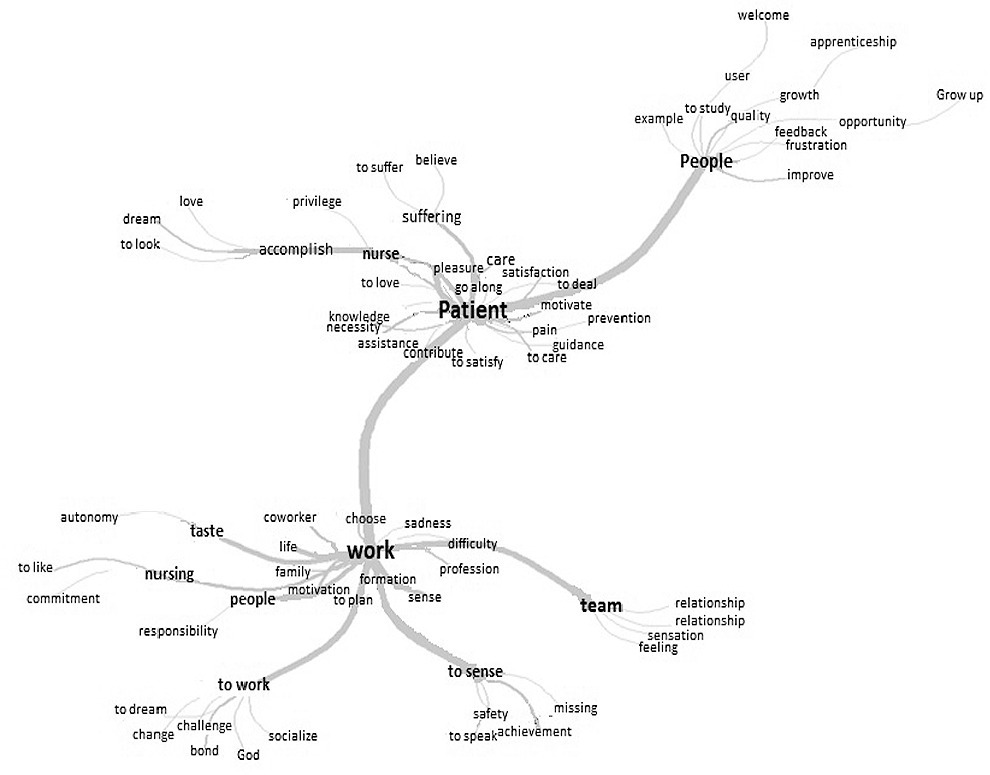-
ORIGINAL ARTICLE
Meaning of work from the perspective of hospital nurses
Revista Brasileira de Enfermagem. 2022;75(2):e20201362
10-25-2022
Abstract
ORIGINAL ARTICLEMeaning of work from the perspective of hospital nurses
Revista Brasileira de Enfermagem. 2022;75(2):e20201362
10-25-2022DOI 10.1590/0034-7167-2020-1362
Views0See moreABSTRACT
Objectives:
to know the meaning of the role of nurses in the hospital environment.
Methods:
this is a descriptive study with a qualitative approach, whose setting was a university hospital in Minas Gerais with 50 nurses. Data were collected through interviews and analyzed according to content analysis, with the contribution of the Interface software from R pour les Analyzes Multidimensionalnelles de Textes et de Questionnaires.
Results:
three categories emerged: “Nurses’ daily work in the hospital environment”; “Work motivation as an influential factor in the meaning of work”; “The two faces of the meaning of work: pleasure and suffering”. Nurses attributed a positive meaning to their work.
Final Considerations:
three dimensions of the meaning of work were highlighted: individual, organizational and social. These influenced the professional, social, working and individual life of nurses.

-
ORIGINAL ARTICLE
Motivation for vocational training: significance to nurses in neonatal intensive care
Revista Brasileira de Enfermagem. 2021;74(1):e20190793
03-03-2021
Abstract
ORIGINAL ARTICLEMotivation for vocational training: significance to nurses in neonatal intensive care
Revista Brasileira de Enfermagem. 2021;74(1):e20190793
03-03-2021DOI 10.1590/0034-7167-2019-0793
Views0See moreABSTRACT
Objectives:
To analyze the motivation of neonatal intensive care nurses and the meanings attributed to the continuity of professional training.
Methods:
qualitative study, developed between August and December 2018, based on interviews with 16 nurses working in Neonatal Intensive Care in cities in seven Health Regions in the State of São Paulo. The theory of self-determination and narrative analysis supported this study.
Results:
the search for specialization and qualification of care is the plot, with the motivation for training initially based on the specialization and qualification of care. Over time, they revisit understandings carried out about care, making considerations about training, factors that influence motivation.
Final Considerations:
the motivation expressed by the nurse in the search for training is shown through movements marked by the limitations apprehended in practice on the care of the risk neonate and the acquisition of knowledge to act with quality in this specific health scenario.
-
ORIGINAL ARTICLE
Group Brief Intervention: effectiveness in motivation to change alcohol intake
Revista Brasileira de Enfermagem. 2020;73(1):e20180138
02-10-2020
Abstract
ORIGINAL ARTICLEGroup Brief Intervention: effectiveness in motivation to change alcohol intake
Revista Brasileira de Enfermagem. 2020;73(1):e20180138
02-10-2020DOI 10.1590/0034-7167-2018-0138
Views0See moreABSTRACT
Objective:
To verify the effectiveness of the group brief intervention (GBI), performed by nurses in motivational stages to change the pattern of alcohol intake.
Method:
Randomized controlled trial with 3-month follow-up. The ruler of readiness for change was applied in 180 individuals with risk or harmful alcohol intake pattern in basic health unit. Only the experimental group (EG) was submitted to the intervention. Both groups (experimental and control [CG]) participated in the follow-up.
Results:
EG had a mean score before GBI=6.55 (SD=3.41) points (preparation). After GBI=8.00 (SD=2.88) points (action) and in the follow-up 7.92 (SD=3.06) points (action). CG presented a mean score before GBI=5.42 (SD=3.26) points (preparation); after GBI=6.67 (SD=3.05) points (preparation) and in the follow up had a mean score of 4.80 (SD=2.86) points (contemplation). There was a statistically significant difference between the two groups at the motivational stages (p≤ 0,03).
Conclusion:
It was evidenced that GBI was effective in increasing the motivation to change harmful alcohol intake.




